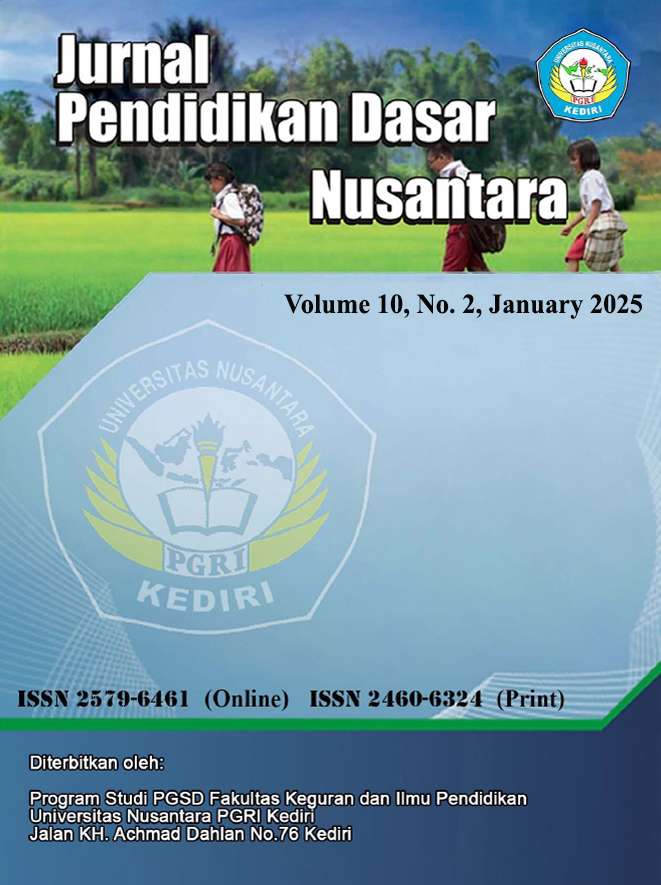The Effect Of Using Problem Based-Learning Model Assisted By Education Games On Motivation And Critical Thingking Skill
DOI:
https://doi.org/10.29407/jpdn.v10i2.24634Keywords:
Problem Based Learning Model, Education Game, Learning Motivation, Critical thinking skill, MathematicsAbstract
This study aims to determine the effect of using the problem based-learning model assisted by education games on the motivation and critical thinking skills of the mathematics subject of grade IV students of SDN 1 Krebet. The method in this study is a quantitative method with a nonequivalent control group design. Sampling is called purposive sampling and class IVA is obtained as the experimental class and IVB as the control. Data collection techniques through questionnaire methods and test methods with t-test hypothesis test analysis techniques. The results of this study indicate that the Problem Based Learning (PBL) model assisted by education games learning media has a significant effect on motivation in grade IV elementary school students. The Problem Based Learning (PBL) model assisted by education games learning media has a significant effect on critical thinking skills in grade IV elementary school students.
Downloads
References
Amir, T. (2010). Inovasi pendidikan melalui problem based learning: bagaimana pendidik memberdayakan pemelajar di era pengetahuan. Pustaka Bleajar.
Ferreira, S. M., Gouin-Vallerand, C., & Hotte, R. (2016). Game based learning: a case study on designing an educational game for children in developing countries. International Conference on Games and Virtual Worlds for Serious Applications (VSGAMES)., 1–8.
Hartatik, S. (2023). Penerapan Problem Based Learning Dalam Meningkatkan Motivasi Dan Hasil Belajar Peserta Didik Sesuai Kurikulum Merdeka. VOCATIONAL: Jurnal Inovasi Pendidikan Kejuruan, 2(4), 335–346. https://doi.org/10.51878/vocational.v2i4.1868
John W, S. (2007). Psikologi pendidikan edisi ke 2. Kencana Prenada Media Group.
Lidiawati, K. R. (2023). Kemampuan Berpikir Kritis Siswa di Indonesia: Rendah atau Tinggi? Jurnal Fakultas Psikologi, Universitas Pelita Harapan, 9(2).
Monalisa, C., Ahda, Y., & Fitria, Y. (2019). Critical Thinking Skill Improvement Using Problem Based Learning (PBL) Model of 4 th Grade Students of Elementary School. International Journal of Science and Research, 8(2), 429–432.
Octavia, S. (2020). Model-model pembelajaran. CV. Budi Utama.
Pribadi, B. A. (2017). Media dan teknologi dalam pembelajaran. Kencana.
Puspitasari, D., Ulfah, M., Ramadhan, I., & Wijayati, Y. F. D. R. (2023). Penerapan Model Pembelajaran Problem Based Learning (PBL) dengan Media Games Dadu dan Kahoot terhadap Hasil Belajar. PTK: Jurnal Tindakan Kelas, 4(1), 135–148. https://doi.org/10.53624/ptk.v4i1.295
Rifa’i, M. H., Tanuki, J., Sudarmaji, I., Lubis, N. F., Hudiah, A., & Fachrurrozi, A. (2022). Model pembelajaran kreatif, inovatif, dan motivatif. Yayasan Wiyata Bestari Samasta.
Rossa, V. (2020). Akibat Pandemi, 40 Persen Pelajar Indonesia Kehilangan Motivasi Belajar. Suara.Com. https://www.suara.com/health/2020/12/16/141248/akibat-pandemi-40-persen-pelajar-indonesia-kehilangan-motivasi-belajar
Rusmono. (2014). strategi Pembelajaran dan Model Problem Based Learning itu perlu: untuk meningkatkan Profesionalisme Guru. Ghalia Indonesia.
Sauri, M. S., Purnomo, Y. W., & Mustadi, A. (2022). Analysis of Student Learning Motivation using Project-Based Learning Method. AL-ISHLAH: Jurnal Pendidikan, 14(3), 3405–3412. https://doi.org/10.35445/alishlah.v14i3.665
Simanjuntak, A. M. S. (2023). Semantik: Jurnal Riset Ilmu Pendidikan, Bahasa dan Budaya. Analisis Faktor-Faktor Penyebab Rendahnya Motivasi Belajar Siswa Pada Mata Pelajaran Bahasa Indonesia Di Sekolah Dasar 106811 Bandar Setia2024, 3.
Sugiyanto. (2010). Model-model pembelajaran inovatif. Yuma Pressindo.
Utami, S., & Faipri Selegi, S. (2013). Pemharuh media pembelajaran interaktif animasi terhadap minat belajar pada mata pelajaran IPS di SD Negeri 3 Tanjung Lago. Jurnal Ilmiah Pendidikan Matematika.
Warsono, & Hariyanto. (2012). Pembelajaran teori aktif dan asesmen. Remaja Rosdakarya.
Downloads
Published
Issue
Section
License
Copyright (c) 2025 Epi Risnandani, Benny Agus Pribadi , Erny Roesminingsih (Author)

This work is licensed under a Creative Commons Attribution-ShareAlike 4.0 International License.
Authors who publish with this journal agree to the following terms:
- Copyright on any article is retained by the author(s).
- The author grants the journal, the right of first publication with the work simultaneously licensed under a Creative Commons Attribution License that allows others to share the work with an acknowledgment of the work’s authorship and initial publication in this journal.
- Authors are able to enter into separate, additional contractual arrangements for the non-exclusive distribution of the journal’s published version of the work (e.g., post it to an institutional repository or publish it in a book), with an acknowledgment of its initial publication in this journal.
- Authors are permitted and encouraged to post their work online (e.g., in institutional repositories or on their website) prior to and during the submission process, as it can lead to productive exchanges, as well as earlier and greater citation of published work.
- The article and any associated published material is distributed under the Creative Commons Attribution-ShareAlike 4.0 International License
































